- Home
- Anthony Ryan
Blood Song Page 4
Blood Song Read online
Page 4
“What about his eyes?” Dentos asked, he had taken a bread roll and was cramming pieces into his mouth, crumbs fountaining from his lips as he spoke. “Ye tellin’ us it was the Dark?”
Nortah laughed, so did Barkus, but the rest of the boys seemed chilled by the suggestion, except Caenis, who was concentrating on a modest portion of chicken and potatoes, apparently indifferent to the conversation.
Vaelin shifted in his seat, disliking the attention. “He fixes you with his eyes,” he explained. “He stares, you stare back, you’re fixed, then he attacks while you’re still wondering what he’s planning. Don’t look at his eyes, look at his feet and his sword.”
Barkus took a bite from an apple and grunted. “He’s right you know. I thought he was trying to hypnotise me.”
“What’s hypnotise?” asked Dentos.
“It’s looks like magic but really it’s just a trick,” Barkus replied. “At last year’s Summertide Fair there was a man who could make people think they were pigs. He’d get them to root in the ground and oink and roll in shit.”
“How?”
“I don’t know, some kind of trick. He’d wave a bauble in front of their eyes and talk quietly to them for a while, then they’d do whatever he said.”
“Do you think Master Sollis can do such things?” asked Jennis, the boy Sollis said looked like a donkey.
“Faith, who knows? I’ve heard the masters of the Orders know many Dark things, especially in the Sixth Order.” Barkus held up a drumstick appreciatively before taking a large bite. “It seems that they know cookery as well. They make us sleep on straw and beat us every hour of the day, but they want to feed us well.”
“Yeh,” Dentos agreed. “Like my uncle Sim’s dog.”
There was a puzzled silence. “Your uncle Sim’s dog?” Nortah enquired.
Dentos nodded, chewing busily on a mouthful of pie. “Growler. Best fightin’ hound in the western counties. Ten victories ’fore he ’ad ’is throat torn out last winter. Uncle Sim loved that dog, ’ad four kids of ’is own, to three diff’rent women mind, but he loved that dog better’n any of ’em, feed Growler ’fore the kids he would. Best of stuff too, mind. Give the kids gruel and the dog beefsteak.” He chuckled wryly. “Rotten old bastard.”
Nortah was unenlightened. “What does it matter what some Renfaelin peasant feeds his dog?”
“So it would fight better,” Vaelin said. “Good food builds strong muscles. That’s why warhorses are fed best corn and oats and not set to grazing pasture.” He nodded at the food on the table. “The better they feed us, the better we’ll fight.” He met Nortah’s eyes. “And I don’t think you should call him a peasant. We’re all peasants here.”
Nortah stared back coldly. “You have no right to lead, Al Sorna. You may be the Battle Lord’s son…”
“I’m no-one’s son and neither are you.” Vaelin took a bread roll, his stomach was growling. “Not any more.”
They lapsed into silence, concentrating on the meal. After a while a fight broke out at one of the other tables, plates and food scattering amidst a flurry of fists and kicks. Some boys joined in right away, others stood by shouting encouragement, most simply stayed at their tables, some not even glancing up. The fight raged for a few minutes before one of the masters, the large man with the seared scalp, came over to break it up, swinging a hefty stick with grim efficiency. The boys who had been in the thick of the fight were checked for serious injury, blood mopped from noses and lips, and sent back to the table. One had been knocked unconscious and two boys were ordered to carry him to the infirmary. Before long the din of conversation returned to the hall as if nothing had happened.
“I wonder how many battles we’ll be in,” Barkus said.
“Lots and lots,” Dentos responded. “You ’eard what the fat master said.”
“They say war in the Realm is a thing of the past,” said Caenis. It was the first time he had spoken and he seemed wary of offering an opinion. “Maybe there won’t be any battles for us to fight.”
“There’s always another war,” Vaelin said. It was something he had heard his mother say, actually she shouted it at his father during one of their arguments. It was before the last time his father went away, before she got sick. The King’s Messenger had arrived in the morning with a sealed letter. After reading it, his father began to pack his weapons and ordered the groom to saddle his best charger. Vaelin’s mother had cried and they went into her drawing room to argue out of Vaelin’s sight. He couldn’t hear his father’s words, he spoke softly, soothingly. His mother would have none of it. “Do not come to my bed when you return!” she spat. “Your stench of blood sickens me.”
His father said something else, still maintaining the same soothing tone.
“You said that last time. And the time before that,” his mother replied. “And you’ll say it again. There’s always another war.”
After a while she began to cry again and there was silence in the house before his father emerged, patted Vaelin briefly on the head and went out to mount his waiting horse. After his return four long months later Vaelin noted that his parents slept in separate rooms.
After the meal it was time for observance. The plates were cleared away and they sat in silence as the Aspect recited the articles of the Faith in a clear, ringing voice that filled the hall. Despite his dark mood, Vaelin found the Aspect’s words oddly uplifting, making him think of his mother and the strength of her belief, which had never wavered throughout her long illness. He wondered briefly if he would have been sent here if she were still alive, and knew with absolute certainty she would never have allowed it.
When the Aspect had finished his recitation he told them to take a moment for private contemplation and offer thanks for their blessings to the Departed. Vaelin sent his love to his mother and asked her guidance for the trials to come, fighting tears as he did so.
The first rule of the Order seemed to be that the youngest boys got the worst chores. Accordingly, after observance Sollis trooped them to the stables, where they spent several foul hours mucking out the stalls. They then had to cart the dung over to the manure mounds in Master Smentil’s gardens. He was a very tall man who seemed incapable of speech, directing them with frantic gestures of his earth-darkened hands and strange, guttural grunts, the varying pitch of which would indicate if they were doing something right or not. His communication with Sollis was different, consisting of intricate hand gestures that the master seemed to understand instantly. The gardens were large, covering at least two acres of the land outside the walls, comprising long, orderly rows of cabbages, turnips and other vegetables. He also kept a small orchard surrounded by a stone wall. It being late winter he was busily engaged in pruning and one of their chores was gathering up the pruned branches for use as kindling.
It was as they carried the baskets of kindling back to the main keep that Vaelin dared ask a question of Master Sollis. “Why can’t Master Smentil speak, Master?”
He was prepared for a caning but Sollis confined his rebuke to a sharp glance. They trudged on in silence for a few moments before Sollis muttered, “The Lonak cut his tongue out.”
Vaelin shivered involuntarily. He had heard of the Lonak, everyone had. At least one of the swords in his father’s collection had been carried through a campaign against the Lonak. They were wild men of the mountains to the far north who loved to raid the farms and villages of Renfael, raping, stealing and killing with gleeful savagery. Some called them wolfmen because it was said they grew fur and teeth and ate the flesh of their enemies.
“How come he’s still livin’, Master?” Dentos enquired. “My uncle Tam fought agin the Lonak an’ said they never let a man live once they got him captured.”
Sollis’s glance at Dentos was markedly sharper than the one he had turned on Vaelin. “He escaped. He is a brave and resourceful man and a credit to the Order. We’ve talked of this enough.” He lashed his cane against Nortah’s legs. “Pick your feet up, Sendahl.”
Afte
r chores it was more sword practice. This time Sollis would perform a series of moves they had to copy. If any of them got it wrong, he made them run full pelt around the practice ground. At first they seemed to make a mistake at every attempt and they did a lot of running, but eventually they got it right more than they got it wrong.
Sollis called an end when the sky began to darken and they returned to the dining hall for an evening meal of bread and milk. There was little talk; they were too tired. Barkus made a few jokes and Dentos told a story about another of his uncles but there was little interest. Following the meal Sollis forced them to run up the stairs to their room, then lined them up, panting, drained, exhausted.
“Your first day in the Order is over,” he told them. “It is a rule of the Order that you can leave in the morning if you wish. It will only get harder from now on so think carefully.”
He left them there, panting in the candlelight, thinking of the morning.
“Do ye think they’ll give us eggs for breakfast?” Dentos wondered.
Later, as Vaelin squirmed in his bed of straw, he found he couldn’t sleep despite his exhaustion. Barkus was snoring but it wasn’t this that kept him awake. His head was full of the enormity of the change in his life over the course of a single day. His father had given him away, pushed him into this place of beatings and lessons in death. It was clear his father hated him, he was a reminder of his dead wife best kept out of sight. Well he could hate too, hate was easy, hate would fuel him if his mother’s love could not. Loyalty is our strength. He snorted a silent laugh of derision. Let loyalty be your strength, Father. My hate for you will be mine.
Someone was crying in the dark, shedding tears on his straw pillow. Was it Nortah? Dentos? Caenis? There was no way to tell. The sobs were a forlorn, deeply lonely counterpoint to the regular woodsaw rhythm of Barkus’s snoring. Vaelin wanted to cry too, wanted to shed tears and wallow in self-pity, but the tears wouldn’t come. He lay awake, restless, heart thumping so hard with alternating hatred and anger that he wondered if it would burst through his ribs. Panic made it beat even faster, sweat beaded his forehead and bathed his chest. It was terrible, unbearable, he had to get out, get away from this place,…
“Vaelin.”
A voice. A word spoken in darkness. Clear and real and true. His racing heart slowed instantly as he sat up, eyes searching the shadowed room. There was no fear for he knew the voice. The voice of his mother. Her shade had come to him, come to offer comfort, come to save him.
She didn’t come again, although he strained his ears for another hour, no further words were spoken. But he knew he had heard it. She had come.
He settled back into the needle discomfort of the mattress, tiredness finally overtaking him. The sobs had ceased and even Barkus’s snores seemed softer. He drifted into a dreamless, untroubled sleep.
CHAPTER TWO
It was a year into his time in the Order when Vaelin first killed a man. A year of hard lessons imparted by hard masters, a year of punishing, unending routine. They woke at the fifth hour and began with the sword, hours of swinging their wooden blades at the posts on the practice ground, trying to fend off Master Sollis’s attacks and copying the increasingly complicated sword scales he taught them. Vaelin continued to be most adept at parrying Sollis’s blows but the master frequently found a way past his guard to send him bruised and frustrated to the dirt. The lesson of not allowing oneself to be fixed by his eyes had been well learned but Sollis knew many other tricks.
Feldrian was given over entirely to sword work but Ildrian was the day of the bow, when Master Checkrin, a muscular, softly spoken Nilsaelin, had them loosing arrows at the butts with their boy-sized strongbows. “Rhythm, boys, it’s all in the rhythm,” he told them. “Notch, draw, loose…Notch, draw, loose…”
Vaelin found the bow a hard skill to master. The weapon was tough to draw and difficult to aim, leaving his fingertips raw from the bowstring and his arms aching with growing muscle. His arrows often sank into the edge of the target or missed altogether. He came to dread the day he would face the Test of the Bow, four arrows sunk into the bull’s-eye at twenty paces in the time it took a dropped scarf to fall to the ground. It seemed an impossible feat.
Dentos quickly proved himself the best archer, his shafts rarely failing to find the bull’s-eye. “Done this before, eh boy?” Master Checkrin asked him.
“Aye, Master. My uncle Drelt taught me, he used to poach the Fief Lord’s deer till they cut his fingers off.”
To Vaelin’s annoyance Nortah was second best, his arrows finding the bull with grating regularity. The tension between them had grown since the first meal, unleavened by the blond boy’s arrogance. He sneered at the failings of the other boys, usually behind their backs, and spoke constantly of his family though none of the others did. Nortah spoke of his family’s lands, their many houses, the days he had spent hunting and riding with his father, who he claimed was First Minister to the King. It was his father who had taught him the bow, a longbow of yew like the Cumbraelins used, not the composite horn and ash of their strongbows. Nortah thought the longbow a superior weapon, all things considered, his father swore by it. Nortah’s father seemed to be a man of many opinions.
Oprian was the day of the staff, taught them by Master Haunlin, the burnt man Vaelin had first seen in the dining hall. They sparred with wooden staffs of about four feet in length, later they would be replaced with the five-foot pole-axe used by the Order when they fought en masse. Haunlin was a cheerful man, with a quick smile and a liking for song. He would often sing or chant as they practised, soldier’s songs mostly and a few love ballads, sung with a strange precision and clarity that reminded Vaelin of the minstrel he had once seen in the King’s palace.
He took to the staff quickly, liking the way it whistled when he swung it, the feel of it in his hands. At times he even preferred it to the sword, it was easier to handle and more solid somehow. His appreciation for the staff deepened when it became clear Nortah had no ability with it at all. His staff was often snapped out of his hands by an opponent’s blow and he was ever sucking numbed fingers.
Kigrian was a day they quickly came to dread, as it meant service in the stables, hours spent shovelling dung, dodging iron-shod hooves and sharp teeth then cleaning the myriad pieces of tack that hung on the walls. Master Rensial was ruler of the stable and his liking for the cane made Master Sollis seem positively restrained. “I said clean it, don’t tickle it, lackwit!” he spat at Caenis, his cane leaving red wheals on the boy’s neck as he tried to work polish into a stirrup. Whatever his harshness to the boys Rensial was all tenderness to his horses, speaking to them in soft whispers and lovingly brushing their hides. Vaelin’s dislike of the man was tempered by the blankness he saw in his eyes. Master Rensial preferred horses to people, his hands twitched constantly and he often stopped in mid-tirade, wandering off mumbling under his breath. The eyes said it all: Master Rensial was mad.
Retrian was a favourite with most of the boys, the day when Master Hutril would teach them the ways of the wild. They were led on long treks through the woods and hills, learning which plants were safe to eat and which could be used as a poison to be smeared on arrowheads. They were taught to light fires without flint and trap rabbits and hares. They would lie for hours in the undergrowth, trying to remain hidden as Hutril hunted them down, usually within a few minutes. Vaelin was often second last to be found with Caenis remaining hidden longest. Of all the boys, even those who had grown up amongst woodland and fields, he proved the most adept in the outdoors, particularly in tracking. Sometimes they would stay in the forest overnight and it was always Caenis who brought in the first meal.
Master Hutril was one of the few masters who never used the cane but his punishments could be severe, once making Nortah and Vaelin run bare-arsed through a copse of nettles for bickering over how best to place a snare. He spoke with a quiet confidence and rarely used more words than he had to, seeming to prefer the sign language some of the
masters used. It was similar to that used by tongueless Master Smentil when he communicated with Sollis, but less complex, designed for use when enemies or prey were near. Vaelin learned quickly, as did Barkus, but Caenis seemed to absorb it instantly, his slender fingers forming the intricate shapes with uncanny accuracy.
Despite his aptitude, Master Hutril seemed oddly distant from Caenis, his praise restrained, if expressed at all. Sometimes, during one of the overnight treks, Vaelin would catch Hutril staring at Caenis from across the camp, his expression unreadable in the firelight.
Heldrian was the hardest of days, hours of running around the practice ground with a heavy stone in each hand, freezing swims across the river, and hard lessons in unarmed combat under Master Intris, a compact but lightning-fast man with a broken nose and several missing teeth. He taught them the secrets of the kick and the punch, how to twist the fist at the last instant, how to raise the knee first then to extend the leg into a kick, how to block a blow, trip an opponent or throw one over your shoulder. Few boys enjoyed Heldrian, it left them too bruised and exhausted to appreciate the evening meal. Only Barkus liked it, his large frame best suited to soaking up the punishment, he seemed impervious to pain and none relished being partnered with him for the sparring.
Eltrian was supposedly a day of rest and observance but for the youngest boys it meant a round of tedious drudgery in the laundry or the kitchen. If they were lucky, they would be chosen to help Master Smentil in the gardens, which at least provided the chance at a stolen apple or two. In the evening there would be extra observance and catechism, this being the Faith’s day, and a solid hour of silent contemplation, where they would sit, heads bowed, each lost in his own thoughts or succumbing to the overpowering need for sleep, which could be dangerous as any boy caught sleeping would earn the harshest beating and a night walking the walls with no cloak.
Vaelin’s favourite part of each day was the hour before lights out. All the discipline would evaporate in a round of raucous banter and horseplay. Dentos would tell another story about his uncles, Barkus would make them laugh with a joke or an uncanny imitation of one of the masters, Caenis, normally given to silence, would tell one of the thousand or more old stories he knew whilst they practised their sign language or sword strokes. He found himself spending more time with Caenis than the others, the slight boy’s reticence and intelligence a faint echo of his mother. For his part Caenis seemed surprised but gratified by the companionship. Vaelin suspected his life before the Order had been somewhat lonely as Caenis was clearly so unused to being with other boys, although neither of them talked of their lives before, unlike Nortah, who had never been able to shake the habit, despite angry responses from the others and the occasional beating from the masters. You have no family but the Order. Vaelin knew the truth of the Aspect’s words now; they were becoming family, they had no-one but each other.

 Raven’s Shadow Book One: Blood Song (Raven's Shadow)
Raven’s Shadow Book One: Blood Song (Raven's Shadow)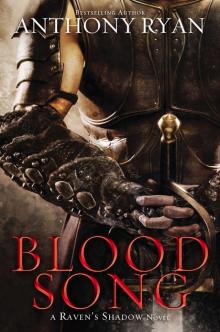 Blood Song
Blood Song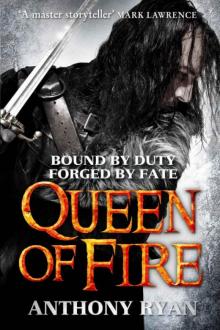 Queen of Fire
Queen of Fire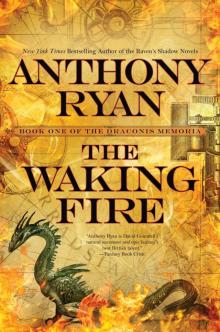 The Waking Fire
The Waking Fire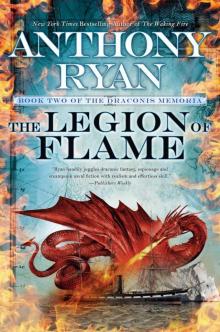 The Legion of Flame
The Legion of Flame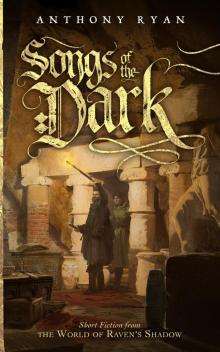 Songs of the Dark
Songs of the Dark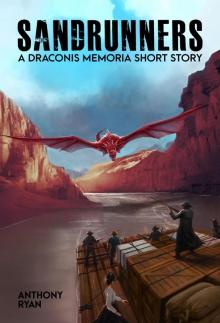 Sandrunners--A Draconis Memoria Short Story
Sandrunners--A Draconis Memoria Short Story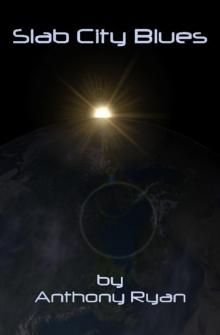 Slab City Blues
Slab City Blues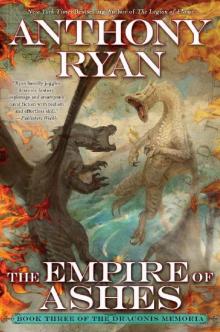 The Empire of Ashes
The Empire of Ashes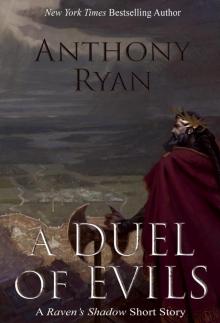 A Duel of Evils
A Duel of Evils The Pariah
The Pariah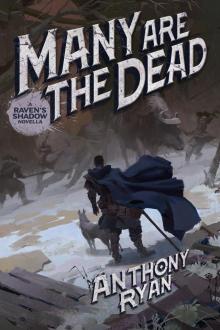 Many Are the Dead
Many Are the Dead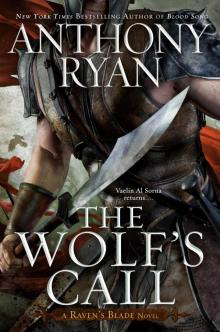 The Wolf's Call
The Wolf's Call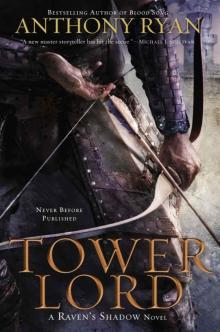 Tower Lord (A Raven's Shadow Novel)
Tower Lord (A Raven's Shadow Novel)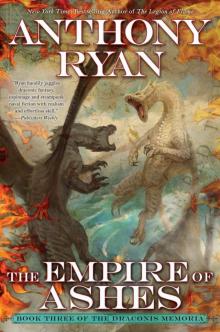 The Empire of Ashes (The Draconis Memoria)
The Empire of Ashes (The Draconis Memoria)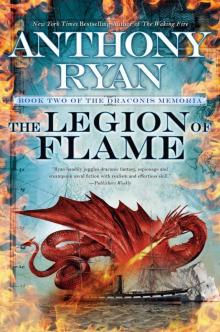 The Legion of Flame (The Draconis Memoria)
The Legion of Flame (The Draconis Memoria)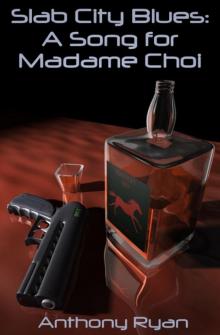 Slab City Blues: A Song for Madame Choi
Slab City Blues: A Song for Madame Choi